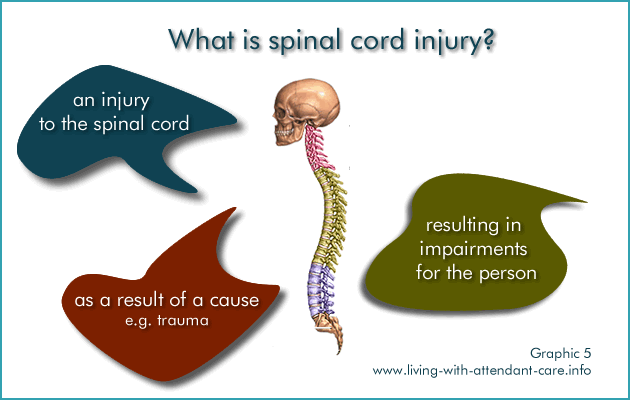- Spinal Cord Injury An introduction for people new to spinal cord injury
- What is spinal cord injury Understanding the essence of spinal cord injury
- Understanding spinal cord injury Where is the injury? C4, C6 . . .
- Injury, effects and impacts Injuries to the spine have effects on the nervous system that lead to impacts in people's lives
- Rehabilitation The rehabilitation process from injury to living in the community
- Adjusting to spinal cord injury People's experiences of having spinal cord injury
- Attendant care challenges Challenges for people with spinal cord injury receiving attendant care
What is spinal cord injury?

A definition of spinal cord injury (SCI)
SCI is damage to the spinal cord that results in a loss of function such as mobility or feeling.
Frequent causes of damage are trauma (car accident, falls, diving etc.) or disease (polio, spina bifida, Friedreich's Ataxia etc.).
Quadriplegia(also referred to as tetraplagia) is loss of function below the neck.
Paraplegiais loss of function below the chest.
The spinal cord does not have to be severed in order for a loss of functioning to occur. In fact, in most people with SCI, the spinal cord is intact, but the damage due to compression or bruising to it results in loss of functioning.
SCI is very different from back injuries such as ruptured disks, spinal stenosis or pinched nerves.
A person can "break their back or neck" yet not sustain a spinal cord injury if only the bones around the spinal cord (the vertebrae) are damaged, but the spinal cord is not affected. In these situations, the individual may not experience paralysis if bone damage is treated correctly.
Spinal Cord Injuries Australia

